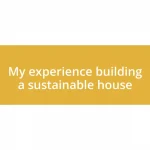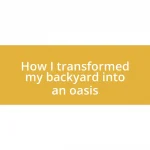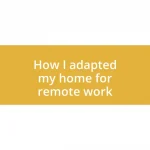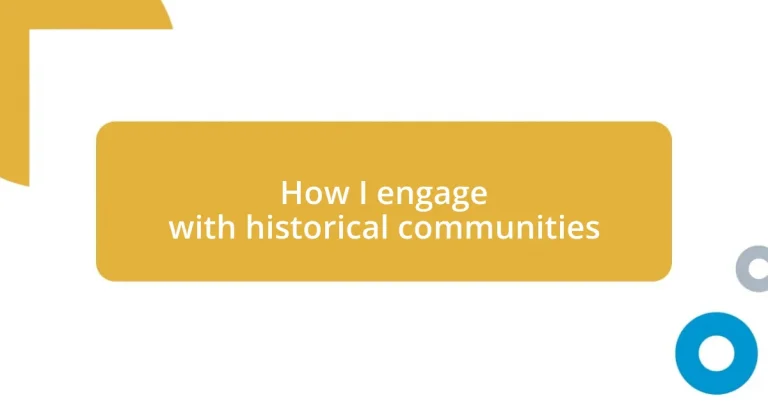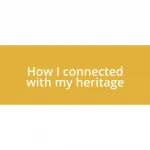Key takeaways:
- Understanding historical communities enhances our connection to the past and shapes our present identities through shared narratives and personal experiences.
- Engaging with local historians and participating in events fosters a deeper appreciation of history and highlights the importance of preserving local legacies.
- Online forums and social media serve as platforms for exchanging diverse historical perspectives, igniting discussions, and galvanizing community engagement around shared histories.
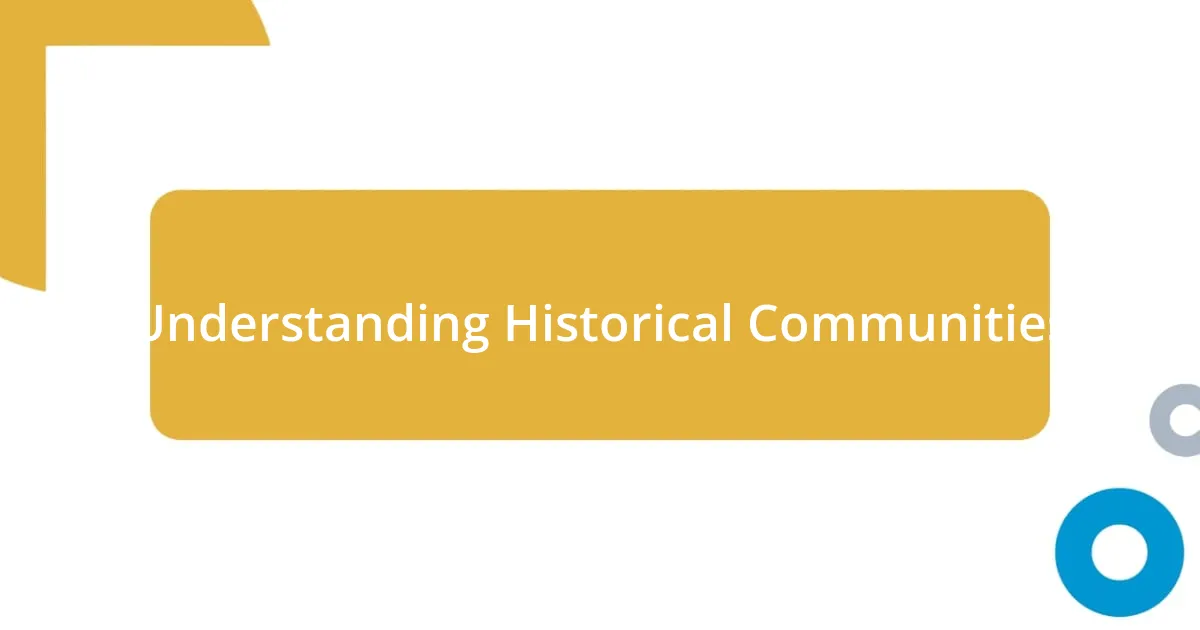
Understanding Historical Communities
Understanding historical communities involves recognizing the complex ways people lived, interacted, and shaped their world. I remember visiting an old town that felt almost alive with history; the buildings whispered stories of the people who once filled those streets. Doesn’t it make you wonder how different life was back then, with each generation leaving its mark on the community fabric?
Diving deeper into the essence of these communities, I find it fascinating to consider how traditions, values, and social structures evolve. For instance, while volunteering at a local history museum, I encountered an elderly gentleman who shared vibrant tales about his childhood in the early 20th century. His narratives painted a vivid picture of community gatherings and celebrations that brought everyone together—doesn’t that spark curiosity about how such gatherings have changed over time?
It’s essential to appreciate the roles historical communities play in shaping our identities today. One day, as I stood in a small, dusty library flipping through old photographs, I felt a connection to those who came before me. Their smiles and stories resonated with my own experiences, making me reflect: how do our present lives reflect the values and struggles of those who lived long ago? This interconnectedness can often transform our understanding of history from mere dates and facts into something deeply personal and relevant.
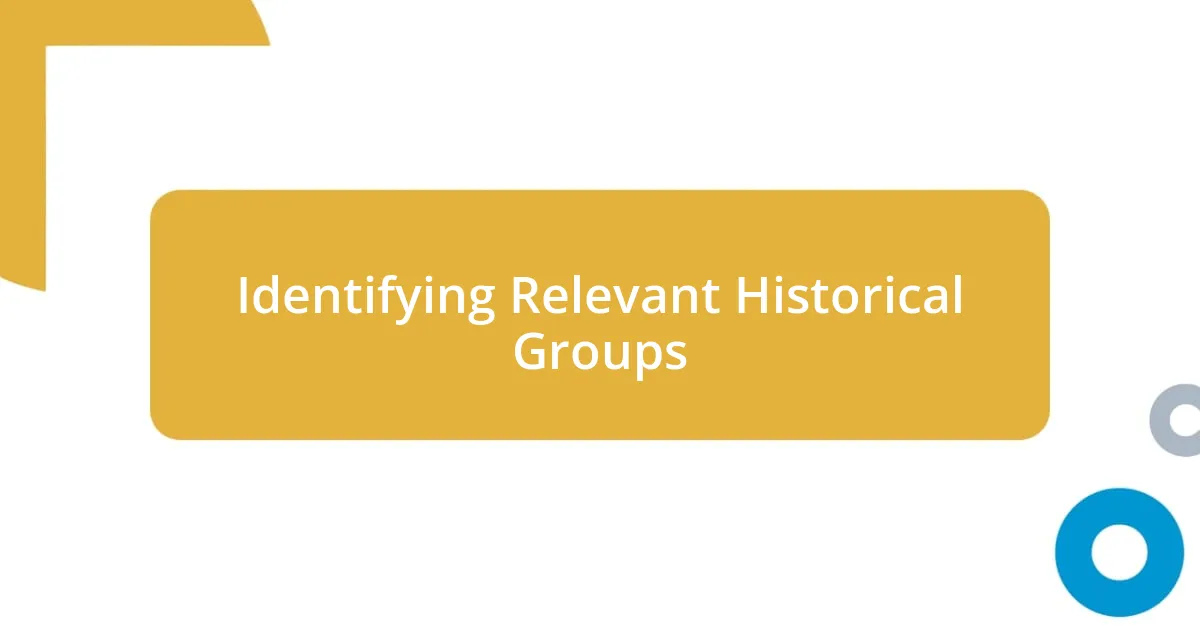
Identifying Relevant Historical Groups
Identifying relevant historical groups begins with recognizing the social, cultural, and geographical landscapes they inhabited. I often find that exploring local archives or community centers reveals hidden gems about groups that may not be widely known but have significantly influenced the region. Engaging with these resources can lead to surprisingly intimate connections with history, as I discovered while researching a small guild that thrived in my town decades ago. Their stories of craftsmanship ignited a sense of reverence for the everyday lives that built our community.
To effectively identify these groups, consider the following steps:
- Research Local Archives: Explore documents, photos, and records that spotlight specific groups in your area.
- Visit Museums or Historical Societies: Many offer curated exhibits that can highlight lesser-known communities.
- Engage with Community Experts: Talk to local historians and cultural practitioners; their insights often bring hidden narratives to light.
- Attend Historical Events: Participate in reenactments or festivals that celebrate specific historical groups, which can deepen your connection.
- Utilize Online Resources: Websites and databases can provide access to community histories that allow for wider exploration beyond your immediate locale.
By following these steps, you can unearth fascinating stories that add depth to our understanding of history.
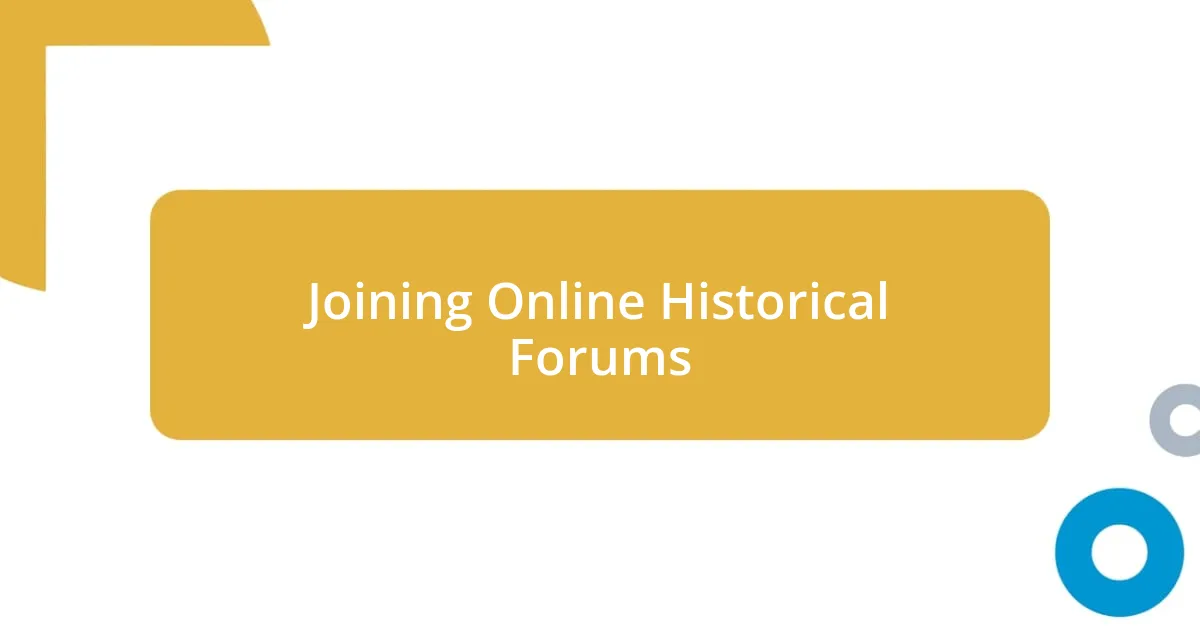
Joining Online Historical Forums
Joining online historical forums has become a vibrant way for me to connect with like-minded individuals who share a passion for history. I still remember my first experience in such a forum. It was a late evening, and I stumbled upon a discussion about World War II that caught my attention. Engaging in that conversation felt like stepping into a time machine—everyone was eager to share insights, and I felt a sense of belonging as I contributed my thoughts. How exhilarating it is to discuss historical events with people from different parts of the world!
What I appreciate about online historical forums is their diversity. These platforms bring together a rich tapestry of perspectives, making the discourse not just informative but also personal. I once participated in a thread where members shared their family history connected to the Civil Rights Movement. Reading their experiences and the emotional weight they carried opened my eyes to the real stories behind the events I had only read about. It made me realize how crucial it is to hear these voices; they bring history to life in a way that textbooks simply can’t.
Sharing insights and interpretations in these forums allows for a deeper understanding of the past, as opposed to isolated study. The encouragement to exchange knowledge fosters a sense of community and camaraderie. One day, I decided to initiate a topic on migration patterns in Europe, and the responses poured in! It was enlightening to witness the collective knowledge of others, as people brought forth historical contexts, personal reflections, and even obscure facts that enriched the discussion. The beauty of these interactions lies in creating a shared narrative that preserves the past while allowing us to reflect on its meaning today.
| Benefits | Challenges |
|---|---|
| Access to diverse perspectives | Information overload |
| Opportunities for networking | Varying levels of expertise |
| Learning from experienced members | Potential for misinformation |
| Real-time discussions | Time zone differences |
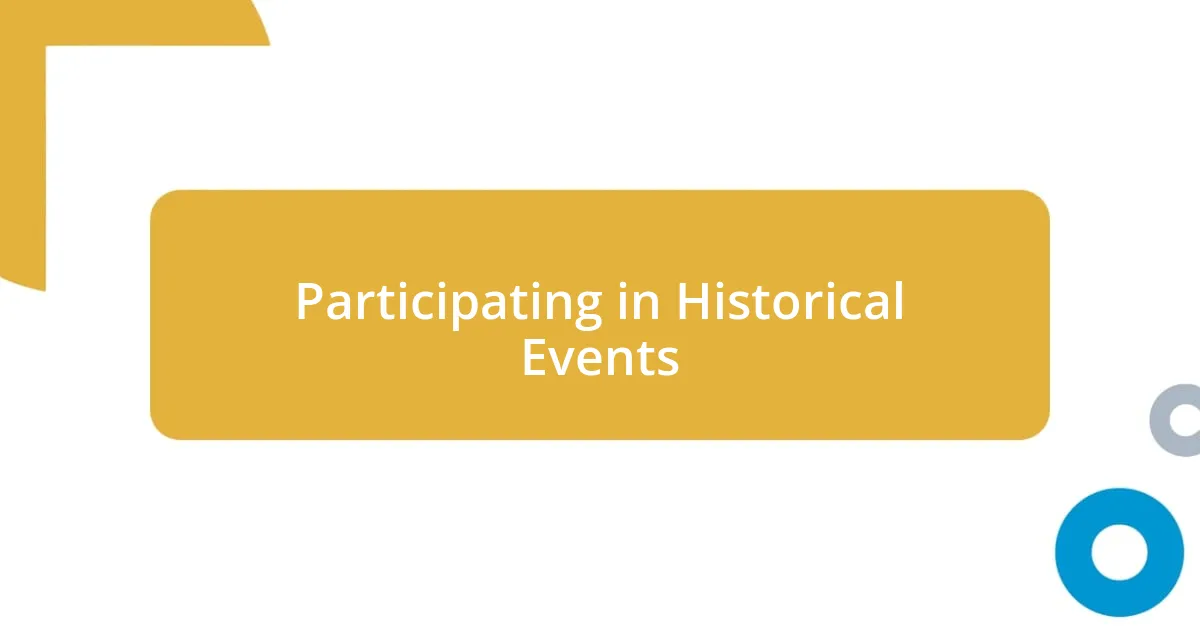
Participating in Historical Events
Participating in historical events has always been a fascinating way for me to immerse myself in the past. I recall attending a living history event where reenactors brought the Civil War to life. Standing amidst the sounds of muskets and the smell of campfire smoke, I felt a tangible connection to the sacrifices made during that tumultuous time. Don’t you find it incredible how such experiences can transport you to another era, allowing you to witness history firsthand?
On another occasion, I volunteered at a local historical festival. The joy of interacting with visitors while dressed in period attire was remarkable. Sharing stories of daily life in the 1800s gave me an appreciation for how far we have come, as well as a deeper respect for those who forged our paths. It challenged me to think: how often do we get the chance to step into someone else’s shoes and truly understand their experiences?
One of the most unforgettable moments occurred during a candlelight vigil held to honor fallen soldiers. As I stood shoulder to shoulder with community members, the atmosphere was heavy with emotion and reverence. It made me realize how participating in such events fosters a sense of unity and remembrance that can transcend generations. It’s a powerful reminder that history doesn’t just belong in textbooks; it lives on through us when we engage with it meaningfully.
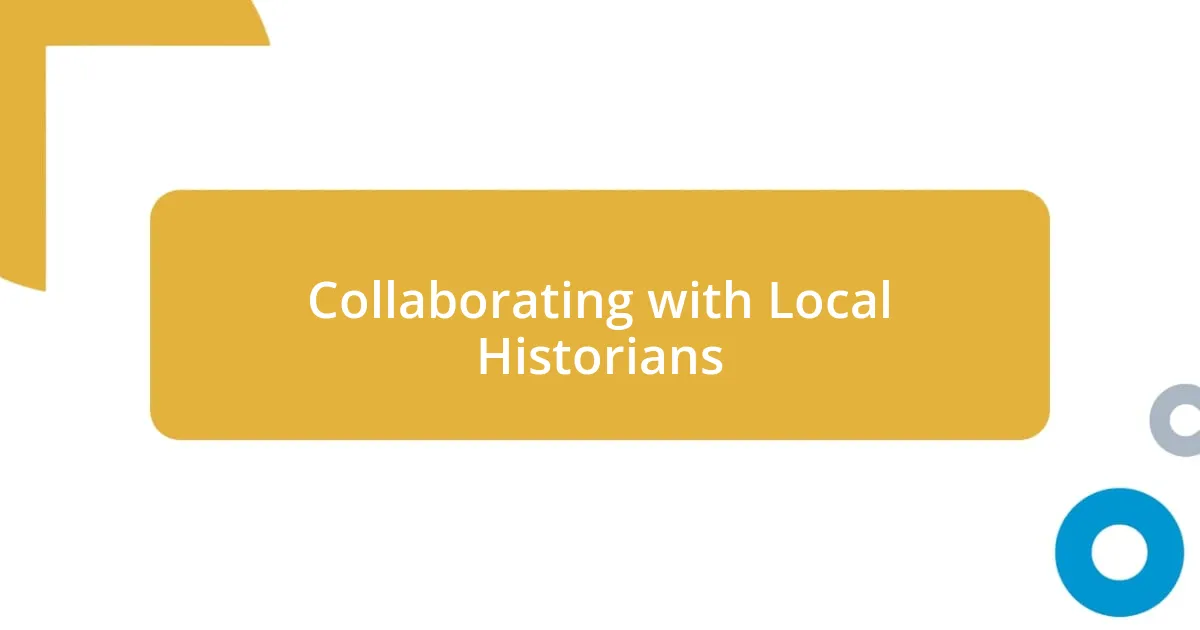
Collaborating with Local Historians
Collaborating with local historians has always been a rewarding experience for me. I vividly remember the first time I joined a small group led by a local historian focusing on our town’s history. As we explored the archives together, I was struck by the wealth of stories that emerged from dusty documents and faded photographs. It felt as if I was unlocking hidden treasures of the past, and they were inviting me to share in that journey.
One of my most cherished moments was a workshop where we collaborated on a community project to create a digital archive of oral histories from long-time residents. Listening to their experiences—whether it was about opening businesses during the mid-20th century or participating in local protests—was like collecting pieces of a vast puzzle. The enthusiasm these historians had for preserving our community’s legacy inspired me tremendously. I often think: how often do we take the time to document our local heroes, the everyday people whose stories enrich our understanding of history?
Engaging with local historians isn’t just about gathering facts; it’s also about forging connections. I recall a discussion about an old, abandoned house rumored to be haunted. As I learned about its significance, the historian encouraged me to share my childhood memories visiting that very site. This exchange highlighted for me how personal experiences can illuminate historical narratives, reminding me that history is not just a collection of dates and events—it’s a living tapestry interwoven with our lives.
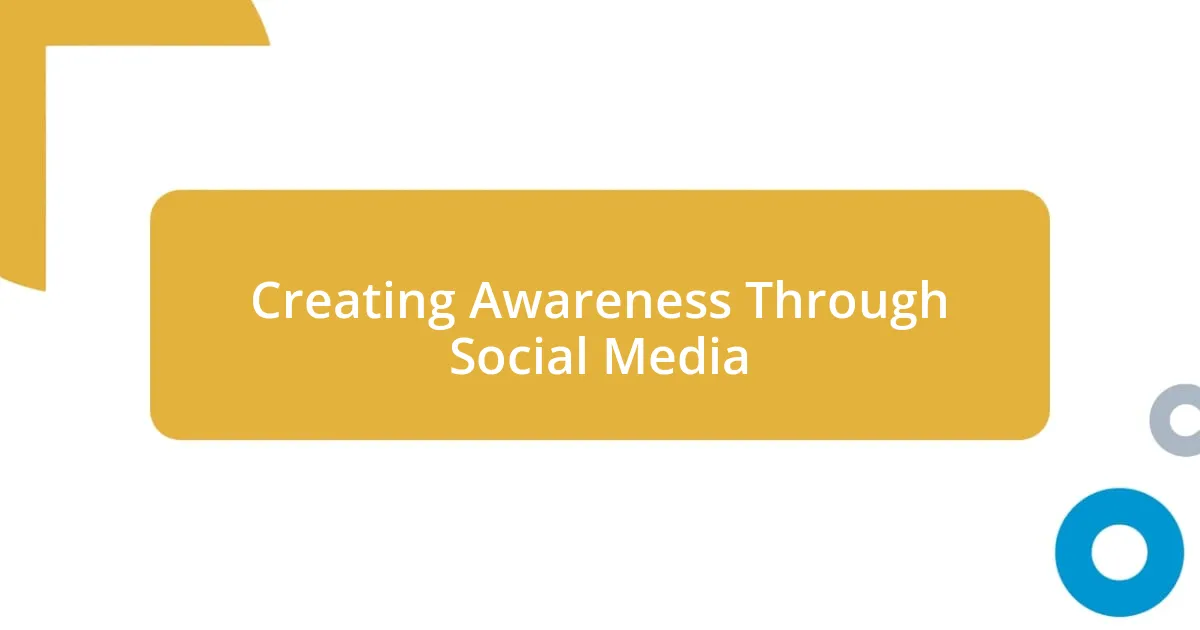
Creating Awareness Through Social Media
Creating awareness through social media has truly transformed the way I connect with historical communities. I remember posting a snapshot from a historical exhibit on Instagram, and to my surprise, it sparked an engaging conversation among my followers. Questions about the exhibit’s artifacts unfolded, and before I realized it, we were diving deep into discussions about our local history. It’s fascinating how a single photo can foster such dynamic exchanges!
Recently, I joined a Facebook group dedicated to preserving our town’s history. Sharing my own stories and insights made me feel like an integral part of something larger. I recall posting about a historic landmark being threatened by development and was moved by the outpouring of support from group members. It made me think: how often do we leverage our online platforms to protect the places that hold our shared memories?
I’ve also explored Twitter, where concise threads about historical debates or anniversaries can ignite lively discussions almost instantly. I shared an article about a local figure whose contributions were largely forgotten, and within hours, others jumped in to share their perspectives and experiences. It brought to light how social media not only informs but galvanizes communities around our shared histories, reminding me once again of the powerful potential of these digital gatherings.
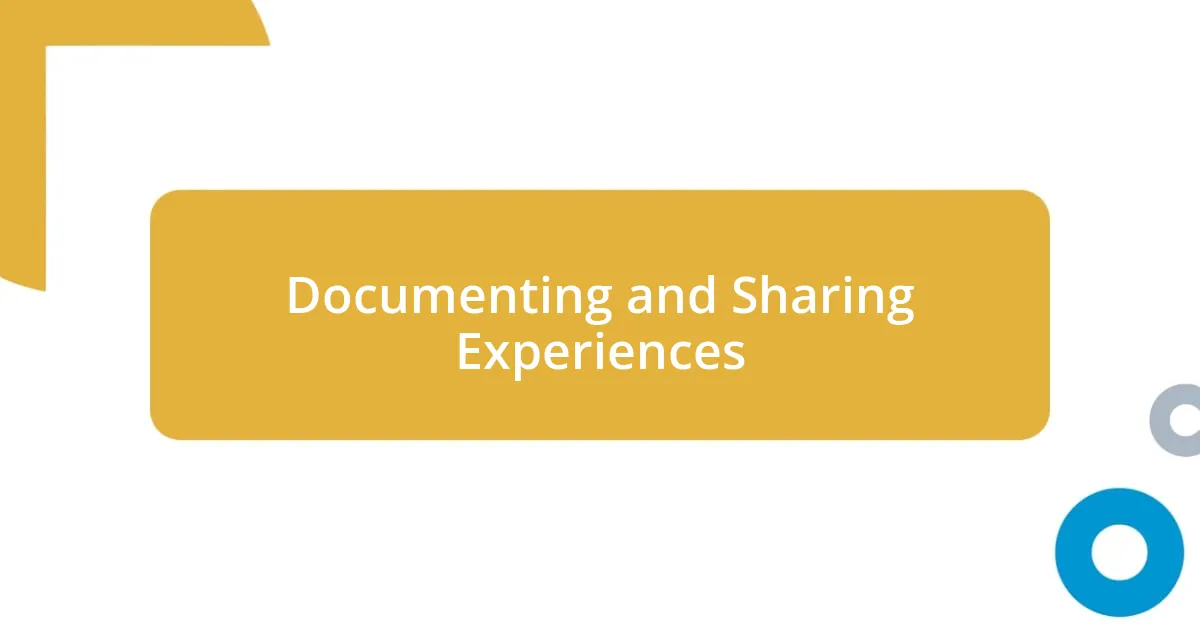
Documenting and Sharing Experiences
Documenting and sharing experiences have become a vital part of my journey within historical communities. One afternoon, as I sat with an elder from my neighborhood, we transcribed her incredible stories into a digital format. The sheer joy reflected in her eyes reminded me how powerful it can be to preserve these narratives. I often find myself asking: how many people have untold stories just waiting to leap into the spotlight?
In another instance, I organized a small event where community members were encouraged to bring personal artifacts related to local history. As I listened to the tales behind each item, from an old letter to a cherished family photograph, I felt an overwhelming sense of connection. It reinforced my belief that these objects carry emotional weight, linking generations and evoking memories that breathe life into history. I sometimes wonder, what if we all took the time to explore the stories tied to our possessions?
I’ve discovered that sharing these documented experiences isn’t solely about showcasing history; it’s about igniting passion within others. One evening, I published a post on my blog detailing a fascinating encounter at a local museum—how an old map revealed hidden neighborhoods of the past. The comments section filled with readers sharing their interpretations and related experiences. It made me realize that once we start sharing, we create a ripple effect, inspiring collective storytelling that enriches our understanding of history even further.


